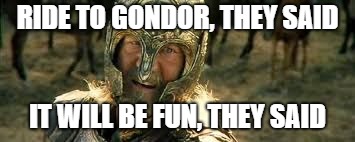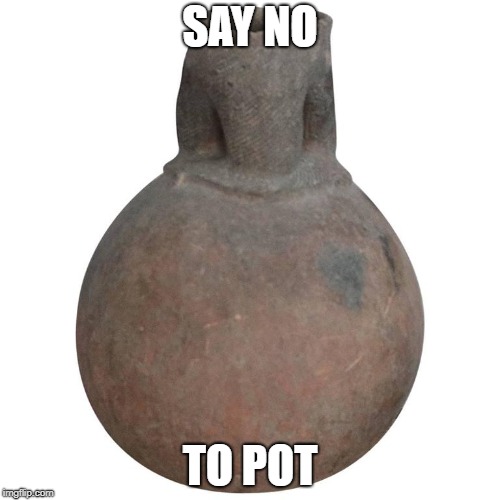How to learn about history (aka. never trust a pot)
For those who study history, there are a few fundamental questions that come up over and over again. Why do people keep on repeating the same mistakes? Why do some civilizations succeed where others fail? What really happened to Gandalf when he fell into the pit of Khazad-dum? If these are the kinds of questions that keep you up at night, I know how you feel: I, too, have lost sleep on more than one occasion wondering about Gandalf.


OK, let's be serious now. The REAL question that keeps historians up at night, rocking in the fetal position in a dark corner, clutching their taquitos, is
But of all the big historical questions, probably the most important is Who invented taquitos and why didn't she/he receive the Nobel Prize? Ha ha - just kidding! We know that Gandalf invented taquitos in 1493 and received the Nobel Prize in that same year, narrowly beating out the guy who invented "2000 Flushes" (originally "2000 Chamber Pots"). The reason? Taquitos taste way better than chamber pots and you don't need 2000 of them in order to feel good about life - but that would certainly be awesome.

93 taquitos later...

How do we know what happened in the past?
Now, at first glance, this may seem like a pretty brainless sort of question. Duh! Instagram! Obviously, yes. But how did people know about what happened in the past before there was Instagram? Yes, to all you screen-agers reading this, there was a time before Instagram. Historians usually refer to this period as "That Boring Time before Instagram when People had Nothing Better to Do so They Invented Civilization." During this time, people used more primitive means of communication, such as mouth-sounds and semaphore. Later, the invention of painting, and then writing, greatly aided the recording of information. For example, most of what we know about the lives of early humans comes from cave paintings in southern France that include pictures of ancient desserts with titles like "Wife Made this Mammoth Cake - HASHTAG YUM" or crude smears of charcoal with captions like "ME WOKE UP LIKE THIS."
But that kind of thing is pretty rare. In fact, the most common ways that we learn about the past can be broken down into two basic categories that we will now consider very seriously and soberly. They are:
a) digging up stuff made by dead people
and
b) reading stuff written by dead people
Now, those may sound about as fun as NASCAR (ie. not fun), but let me assure you, it's way worse than you think.

1. DIGGING STUFF UP
Now, I know what you're thinking: Hey, that doesn't sound so bad! I like digging! Well, that's because you've never done any real archaeology before. Archaeology comes from a Latin word that means Getting paid nothing to dig in the sweltering deserts of Nicaragua and all I found was this stupid pot and OW I AM SO DONE WITH THESE MOSQUITOES THAT'S IT I'M GOING TO FILM SCHOOL. Or something like that. Really, though, all these people do is scratch away at the dirt with tiny little chisels and then find a lump of something that they brush painstakingly for hours, only to find that it's another piece of dinosaur feces, or, if they're really lucky, a pot. Pots are like, their favourite thing ever. Seriously, you should see how excited archaeologists get about pots. It's embarrassing. I mean, I'd understand if the pot had something cool in it, like a Calormene dagger or a Nazgul tooth, but they never do. It's literally just a pot, and the archaeologists are all like, "Look! This 90 billion year old pot was probably used for holding... olive oil!!! CALL THE PRESIDENT!" Sigh. These people need lives. Says the person who can recite Fellowship of the Ring word for word.
Granted, archaeology is probably pretty fun if you have a passion for it. Take my one-year-old son, Bennett: he likes playing in the dirt, and he also likes putting things in his mouth. Things could get pretty interesting if you took him along on a dig...
***
Low-paid archaeologist #1: Scratching in the dirt. Pulls out a lump of something. "Look, Dr. Bennett! We've found it! The legendary Skull of Imhotep, from the fourth dynasty of Egypt! Look how perfectly the hieroglyphs have been -"
Bennett (grabs Skull of Imhotep): NOM NOM NOM
Low-paid archaeologist #1: "NOOOOOOOOOO!!! Dr. Bennett!!! You're destroying the - oh, wait, it's just a pot. Never mind." Returns to dirt-scratching.
Low-paid archaeologist #2: "Did you say 'pot'?!?!" Lunges wildly for the pot.

But that kind of thing is pretty rare. In fact, the most common ways that we learn about the past can be broken down into two basic categories that we will now consider very seriously and soberly. They are:
a) digging up stuff made by dead people
and
b) reading stuff written by dead people
Now, those may sound about as fun as NASCAR (ie. not fun), but let me assure you, it's way worse than you think.

1. DIGGING STUFF UP
Now, I know what you're thinking: Hey, that doesn't sound so bad! I like digging! Well, that's because you've never done any real archaeology before. Archaeology comes from a Latin word that means Getting paid nothing to dig in the sweltering deserts of Nicaragua and all I found was this stupid pot and OW I AM SO DONE WITH THESE MOSQUITOES THAT'S IT I'M GOING TO FILM SCHOOL. Or something like that. Really, though, all these people do is scratch away at the dirt with tiny little chisels and then find a lump of something that they brush painstakingly for hours, only to find that it's another piece of dinosaur feces, or, if they're really lucky, a pot. Pots are like, their favourite thing ever. Seriously, you should see how excited archaeologists get about pots. It's embarrassing. I mean, I'd understand if the pot had something cool in it, like a Calormene dagger or a Nazgul tooth, but they never do. It's literally just a pot, and the archaeologists are all like, "Look! This 90 billion year old pot was probably used for holding... olive oil!!! CALL THE PRESIDENT!" Sigh. These people need lives. Says the person who can recite Fellowship of the Ring word for word.
Granted, archaeology is probably pretty fun if you have a passion for it. Take my one-year-old son, Bennett: he likes playing in the dirt, and he also likes putting things in his mouth. Things could get pretty interesting if you took him along on a dig...
***
Bennett (grabs Skull of Imhotep): NOM NOM NOM
Low-paid archaeologist #1: "NOOOOOOOOOO!!! Dr. Bennett!!! You're destroying the - oh, wait, it's just a pot. Never mind." Returns to dirt-scratching.
Low-paid archaeologist #2: "Did you say 'pot'?!?!" Lunges wildly for the pot.
***
Now, before I start getting nasty comments about the above scenario, I already know that 'low-paid archaeologist' is a redundancy; after all, my own dreams were crushed back in middle school when I went to the Field Museum in Chicago and had a conversation with a person who worked there. At the time, my life's ambition was to become an Egyptologist (because I had seen The Mummy and was like, sign me up, bro). The conversation went something like this:
13-year-old me (eyes wide and shining with hope): "Excuse me, sir, could you tell me how to become an... Egyptologist? Please?"
Museum staff member (heavy Brooklyn accent): "Ha ha ha! You're joking, right, kid? You want to be on welfare by 25?" Takes out cigarette and lights it on 7000 year old Babylonian vase.
13-year-old me (lip quivering): "Um, well, it's just that... I really like Egypt and stuff... and, I was just, well, hoping that -"
Museum staff member (taking a pull of cigarette): "Look, kid, I hate to break it to you, but Egyptology ain't a real job. There's no money in it. Now, scram, before I lose my patience. You wanna end up like this guy?" Motions to decapitated Sumerian mummy.
13-year-old me: "Well, um -"
Museum staff member: Exhales cloud of smoke in my face.
13-year-old me: "Well, um -"
Museum staff member: Exhales cloud of smoke in my face.
OK, so the staff member might have been a little bit nicer in real life, but you get the idea. To get back to the topic at hand (who is responsible for these weird tangents, anyway?), archaeology is one of the most important ways that we can learn about the past. This is because archaeology provides us with pure, unquestionable facts. You can't argue with a pot, after all! And if you did, the pot would win because, unlike you, pots cannot be wrong, or fall prey to logical fallacies. They also have no mouths and would get major bonus points for remaining stoic and unmoved as you slowly lose your patience:
You: "Why - can't - you - just - admit it. ADMIT IT ALREADY!!! GANDALF WOULD BEAT DUMBLEDORE IN A DUEL, HANDS DOWN!!!!!!!!"
Pot:
You: Crumple in defeat
But actually, this is an oversimplification. The truth is that pots and other seemingly innocent lumps of clay, stone, and wood can totally lie to you. They are, like, big time liars. They are devious. Remember that old fable about the pot who cried wolf? What's that? You've never heard of it? Exactly - because the pots have repressed it. FAKE NEWS.

Just as an example of how dishonest pots can be (as if you needed one), consider the following scenario which is based loosely (ie. not actually based) on a real event that happened in 1926. A low-paid archaeologist was digging in the Iranian desert and found a decorated clay pot; he was like, "Hey, it's a Persian clay pot! Probably Sassanid, due to the intricacy of the brushwork on the..." blah blah blah you get the idea. Anyway, he took it in for carbon-dating, and when they ran it through the carbon detector-thing they saw a hidden pictogram which, when translated, read: Made in Grunthal. Oh ba yo! Serves you right for trusting a pot!
2. READING STUFF
I'll be honest. There are few things in life that excite me more than reading stuff written by dead people. Some of my favourite people are, in fact, dead! J.R.R. Tolkien, C.S. Lewis, King Theoden - they may have kicked the bucket a long time ago, but that doesn't make them any less cool. Also, Theoden didn't write anything but he did get a wicked death scene.
You: "Why - can't - you - just - admit it. ADMIT IT ALREADY!!! GANDALF WOULD BEAT DUMBLEDORE IN A DUEL, HANDS DOWN!!!!!!!!"
Pot:
You: Crumple in defeat
But actually, this is an oversimplification. The truth is that pots and other seemingly innocent lumps of clay, stone, and wood can totally lie to you. They are, like, big time liars. They are devious. Remember that old fable about the pot who cried wolf? What's that? You've never heard of it? Exactly - because the pots have repressed it. FAKE NEWS.

Just as an example of how dishonest pots can be (as if you needed one), consider the following scenario which is based loosely (ie. not actually based) on a real event that happened in 1926. A low-paid archaeologist was digging in the Iranian desert and found a decorated clay pot; he was like, "Hey, it's a Persian clay pot! Probably Sassanid, due to the intricacy of the brushwork on the..." blah blah blah you get the idea. Anyway, he took it in for carbon-dating, and when they ran it through the carbon detector-thing they saw a hidden pictogram which, when translated, read: Made in Grunthal. Oh ba yo! Serves you right for trusting a pot!
2. READING STUFF
I'll be honest. There are few things in life that excite me more than reading stuff written by dead people. Some of my favourite people are, in fact, dead! J.R.R. Tolkien, C.S. Lewis, King Theoden - they may have kicked the bucket a long time ago, but that doesn't make them any less cool. Also, Theoden didn't write anything but he did get a wicked death scene.

That being said, written sources (or 'books' in boring-people talk) have their problems, too. For one thing, authors can sometimes be biased, misleading, or just plain ignorant. Now, I know what you're thinking: Don't be so hard on yourself, Jon! But this problem is not just limited to blogs in the boondocks of the internet. Even fine, upstanding, ancient dead people sometimes got it wrong. For example, this Greek dude named Herodotus is often called the 'Father of History' because he apparently wrote the world's first history book* which, in a stroke of creative genius, was titled - wait for it -

Wow.

The world's first history book, and that's what you've got?

Anyways, in "The Histories," Herodotus makes some pretty sketchy claims. For example, he says that the Persian army that invaded Greece in 480 BC was made up of two million men! Two million! Ha! As if two million men could even fit into Greece - there are way too many statues lying around! Seriously, you can't even move without tripping over a statue, or so I gather from pictures. As a result, most historians believe that the Persian force was no bigger than 200,000 at the most, and even that seems like a stretch to me. Who could possibly convince 200,000 guys to make this kind of road trip in a time before Wendy's, flush toilets, and mini-vans with TVs? No way would anyone in their right mind agree to this. Five minutes out of Susa and Xerxes would have been like IF I HEAR ONE MORE "ARE WE THERE YET" I AM GOING TO COME BACK THERE AND HEADS ARE GOING TO ROLL - I'M LOOKING AT YOU, IMMORTALS.

So in the end, there really isn't a perfect way to learn about the past; they both have their pros and cons. But if you ask me, I'd rather cosy up in the quiet of an air-conditioned library with a pile of potentially-misleading and mind-numbingly boring books than risk getting myself shivved by some clay pot with an attitude. Squints at innocuous-looking pot on mantelpiece. I've got my eye on you.
"The Histories"

Wow.

The world's first history book, and that's what you've got?

Anyways, in "The Histories," Herodotus makes some pretty sketchy claims. For example, he says that the Persian army that invaded Greece in 480 BC was made up of two million men! Two million! Ha! As if two million men could even fit into Greece - there are way too many statues lying around! Seriously, you can't even move without tripping over a statue, or so I gather from pictures. As a result, most historians believe that the Persian force was no bigger than 200,000 at the most, and even that seems like a stretch to me. Who could possibly convince 200,000 guys to make this kind of road trip in a time before Wendy's, flush toilets, and mini-vans with TVs? No way would anyone in their right mind agree to this. Five minutes out of Susa and Xerxes would have been like IF I HEAR ONE MORE "ARE WE THERE YET" I AM GOING TO COME BACK THERE AND HEADS ARE GOING TO ROLL - I'M LOOKING AT YOU, IMMORTALS.

So in the end, there really isn't a perfect way to learn about the past; they both have their pros and cons. But if you ask me, I'd rather cosy up in the quiet of an air-conditioned library with a pile of potentially-misleading and mind-numbingly boring books than risk getting myself shivved by some clay pot with an attitude. Squints at innocuous-looking pot on mantelpiece. I've got my eye on you.
***
*That, or he named his kid 'History' - personally, this seems way more likely to me. What a phony.

Comments
Post a Comment